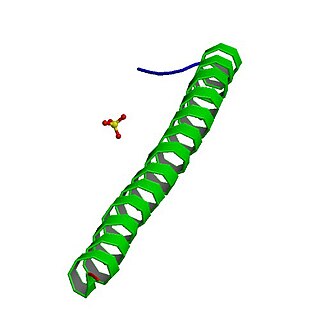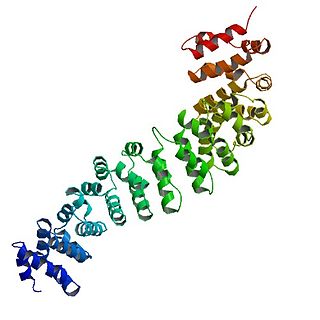GSK3B interacting protein is a protein that in humans is encoded by the GSKIP gene. [5]
GSK3B interacting protein is a protein that in humans is encoded by the GSKIP gene. [5]
This gene encodes a protein that is involved as a negative regulator of GSK3-beta in the Wnt signaling pathway. The encoded protein may play a role in the retinoic acid signaling pathway by regulating the functional interactions between GSK3-beta, beta-catenin and cyclin D1, and it regulates the beta-catenin/N-cadherin pool. The encoded protein contains a GSK3-beta interacting domain (GID) in its C-terminus, which is similar to the GID of Axin. The protein also contains an evolutionarily conserved RII-binding domain, which facilitates binding with protein kinase-A and GSK3-beta, enabling its role as an A-kinase anchoring protein. Alternatively spliced transcript variants have been observed for this gene.

Adenomatous polyposis coli (APC) also known as deleted in polyposis 2.5 (DP2.5) is a protein that in humans is encoded by the APC gene. The APC protein is a negative regulator that controls beta-catenin concentrations and interacts with E-cadherin, which are involved in cell adhesion. Mutations in the APC gene may result in colorectal cancer.
Frzb is a Wnt-binding protein especially important in embryonic development. It is a competitor for the cell-surface G-protein receptor Frizzled.

Catenin beta-1, also known as β-catenin, is a protein that in humans is encoded by the CTNNB1 gene.

Beta-catenin-interacting protein 1 is a protein that is encoded in humans by the CTNNBIP1 gene.

Glycogen synthase kinase 3 beta, also known as GSK3B, is an enzyme that in humans is encoded by the GSK3B gene. In mice, the enzyme is encoded by the GSK-3β gene. Abnormal regulation and expression of GSK3β is associated with an increased susceptibility towards bipolar disorder.

Axin-1 is a protein that in humans is encoded by the AXIN1 gene.

CCAAT/enhancer-binding protein alpha is a protein encoded by the CEBPA gene in humans. CCAAT/enhancer-binding protein alpha is a transcription factor involved in the differentiation of certain blood cells. For details on the CCAAT structural motif in gene enhancers and on CCAAT/Enhancer Binding Proteins see the specific page.

Frizzled-10 is a protein that in humans is encoded by the FZD10 gene. FZD10 has also been designated as CD350.

Segment polarity protein dishevelled homolog DVL-1 is a protein that in humans is encoded by the DVL1 gene.

Microtubule-actin cross-linking factor 1, isoforms 1/2/3/5 is a protein that in humans is encoded by the MACF1 gene.

Ninein is a protein that in humans is encoded by the NIN gene. Ninein, together with its paralog Ninein-like protein is one of the proteins important for centrosomal function. This protein is important for positioning and anchoring the microtubules minus-ends in epithelial cells. Localization of this protein to the centrosome requires three leucine zippers in the central coiled-coil domain. Multiple alternatively spliced transcript variants that encode different isoforms have been reported.

Axin-2 also known as axin-like protein (Axil) or axis inhibition protein 2 (AXIN2) or conductin is a protein that in humans is encoded by the AXIN2 gene.

Transcriptional regulator Kaiso is a protein that in humans is encoded by the ZBTB33 gene. This gene encodes a transcriptional regulator with bimodal DNA-binding specificity, which binds to methylated CGCG and also to the non-methylated consensus KAISO-binding site TCCTGCNA. The protein contains an N-terminal POZ/BTB domain and 3 C-terminal zinc finger motifs. It recruits the N-CoR repressor complex to promote histone deacetylation and the formation of repressive chromatin structures in target gene promoters. It may contribute to the repression of target genes of the Wnt signaling pathway, and may also activate transcription of a subset of target genes by the recruitment of catenin delta-2 (CTNND2). Its interaction with catenin delta-1 (CTNND1) inhibits binding to both methylated and non-methylated DNA. It also interacts directly with the nuclear import receptor Importin-α2, which may mediate nuclear import of this protein. Alternatively spliced transcript variants encoding the same protein have been identified.

Mitogen-activated protein kinase kinase kinase 4 is an enzyme that in humans is encoded by the MAP3K4 gene.

Proto-oncogene FRAT1 is a protein that in humans is encoded by the FRAT1 gene.

GSK-3-binding protein FRAT2 is a protein that in humans is encoded by the FRAT2 gene.

Integrin-linked kinase-associated serine/threonine phosphatase 2C is an enzyme that in humans is encoded by the ILKAP gene.

Casein kinase I isoform alpha is an enzyme that in humans is encoded by the CSNK1A1 gene.

Dishevelled (Dsh) is a family of proteins involved in canonical and non-canonical Wnt signalling pathways. Dsh is a cytoplasmic phosphoprotein that acts directly downstream of frizzled receptors. It takes its name from its initial discovery in flies, where a mutation in the dishevelled gene was observed to cause improper orientation of body and wing hairs. There are vertebrate homologs in zebrafish, Xenopus (Xdsh), mice and humans. Dsh relays complex Wnt signals in tissues and cells, in normal and abnormal contexts. It is thought to interact with the novel protein, SPATS1, when regulating the Wnt Signalling pathway.

Zinc finger BED domain-containing protein 3 also known as axin-interacting protein is a protein in humans that is encoded by the ZBED3 gene.
This article incorporates text from the United States National Library of Medicine, which is in the public domain.
| This article on a gene on human chromosome 14 is a stub. You can help Wikipedia by expanding it. |